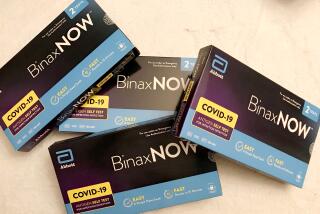Medicare to Pay for Home Coumadin Blood Tests
WASHINGTON — Medicare will soon begin paying for thousands of Americans who take the blood thinner Coumadin to use an at-home test to ensure the drug is working properly, the government announced Wednesday.
But at least for now, the payments will be restricted for patients who use Coumadin, or the generic version called warfarin, because they have artificial heart valves.
That’s a small segment of the 1.8 million Americans who take warfarin for various medical conditions. The Food and Drug Administration has approved at-home testing for anyone who uses warfarin. But the Centers for Medicare and Medicaid Services, which administers federal health insurance for the elderly, says it isn’t yet convinced that paying for other Medicare patients to get at-home testing is cost-effective.
Regular testing to ensure the right amount of warfarin in patients’ blood is vital. Too much makes blood too thin, causing everything from nosebleeds to bleeding in the brain. Too little can cause deadly blood clots.
So warfarin patients make weekly doctor visits until the physician figures out their optimum dose. They then must get regular--often monthly--retesting for as long as they take the drug. That’s because eating vitamin K-rich vegetables, drinking alcohol, taking certain over-the-counter medicines and smoking can change warfarin levels in the bloodstream.
Patients can make repeat visits at so-called Coumadin clinics, where nurses or technicians run the simple test, or take an at-home test called Protime, sold since 1997 by International Technidyne Corp. A competing at-home test made by Johnson & Johnson subsidiary LifeScan is due to go on sale next year.
But International Technidyne says home testing has been slow to gain popularity largely because Medicare, until now, hasn’t paid for it. Indeed, the Centers for Medicare and Medicaid Services discovered that fewer than 5% of warfarin patients do home testing.
Manufacturers, cardiologists and other medical groups have long urged Medicare to pay for home testing. When the FDA approved the first home test, the agency touted it as a way for more frequent testing so that patients might avoid blood-thinning side effects.
“This simple home test can help Medicare beneficiaries reduce their risks of strokes and bleeding,” agreed Health and Human Services Secretary Tommy G. Thompson in announcing the Medicare decision.
Protime consists of a hand-held electronic device that costs from $1,000 to $1,200, and blood-testing strips that cost $5 a week. But test proponents have long argued that that’s far cheaper than treating, say, a warfarin-caused stroke.
More to Read
Inside the business of entertainment
The Wide Shot brings you news, analysis and insights on everything from streaming wars to production — and what it all means for the future.
You may occasionally receive promotional content from the Los Angeles Times.










